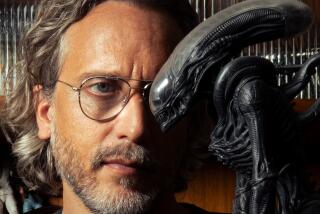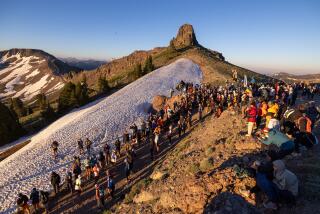‘From a big race, I learn a lot about overcoming’
With every marathon she runs, Barbara Alvarez, a La Jolla psychotherapist, redefines what it means to be a 47-year-old woman with a husband and two children. Alvarez has run 50 marathons in the last five years, including the Hawaii Ironman Triathlon and the 146-mile Badwater Race in Death Valley last year. The Badwater requires participants to run continuously, catching brief snatches of sleep. Alvarez finished third behind two men, setting a women’s record of 50 hours, 2 minutes, 10 seconds. She became the fourth woman ever to finish the torturous course from Death Valley, 282 feet below sea level, to the top of 14,500-foot Mt. Whitney--the lowest and highest points in the 48 states. Alvarez returned earlier this month from her most recent race, the Marathon des Sables, a 130-mile “Marathon of the Sands” across Morocco. She was interviewed by Times Staff Writer G. Jeanette Avent and photographed by Bruce K. Huff.
The Marathon des Sables was a seven-day race, and we ran 12 to 42 miles a day. We had no pacers to run with us, but the organizers had a helicopter monitoring the 200 runners because somebody died last year. They also had two camels to pick up people.
My twin sister and I were in the last wave of 40 people to leave the starting line. Everyone ran a certain mileage every day, and our time was measured. We passed 180 people and finished in the top 20 among men and women. We left behind 180 really tough guys. It felt great because we are both 47 years old. People think at that age you don’t compete any more, but you can.
We carried our food, clothing, supplies and 9 1/2 liters of water on our backs each day. We had our sleeping bags and slept on the dirt in Bedouin tents each night. There were no showers or restrooms.
Each day, we carried 23 pounds. Some people had big blisters because their packs were heavy. But we brought very little clothing and powdered food to mix with water. We ate very little, about 1,200 calories a day. At night we fantasized about all kinds of food. We’d talk about food for hours and hours.
About 40 people got lost. There were some poles to mark the course, but if you didn’t find the poles, a compass was no good. We got lost a little bit between the sand dunes.
This race was the hardest race on the feet. I lost four toenails. Usually we have huge, thick shoes, and we drill holes into the toenails with a needle to take the pressure off. If the pressure gets too much, the nails fall off. The body is not made for 100-mile races, so we have tricks to help nature a little.
On the third day, I was running so hard and it was great. I was doing so well, and I didn’t care what my body was saying. But I had to pay. I was sick all day on the fourth day.
I was losing it that day. The self-talk in my head said, “I don’t care who passes me. If I can’t go farther, it’s OK.” I thought I didn’t do well that day, but it was a big surprise coming into the finish line. Most women did not do well that day. So I was still OK, I still had my place.
Many times I could have just given up. But I have not given up yet in 50 marathons. From a big race, I learn a lot about overcoming. It is not easy to survive and make it through. It’s the heat, the cold, it’s too steep, too low. You name it, it’s always there.
The sport has taught me to overcome. I can really show my patients when they are at their lowest how to overcome. If I were not healthy, I don’t think I could help as much. The sport gives me strength and balance. I tell them not to give up so quickly--in their relationships, when they’re suffering from depression, or whatever they’re going through in life. Just wait, one more corner. Maybe it’ll look totally different from then on, and it does. A little more, one day at at time, one hour at a time. Give it a minute more.
On the last day of the race, we were running in a sandstorm. It gets to be dark and the sun goes away. There were clouds of sand, and I still have some in my shoes. But the last day was also the best part. We could see a mountain range and then water from a river. We hadn’t seen water for so long in the desert.
On the other side of the river, all these people from the village greeted us. I had four children holding onto my hands. This was the big end. The runners had all gotten so close to one another. We were all hugging and kissing. We had talked the same language of pain, and the joy was so great. That was a special moment.


